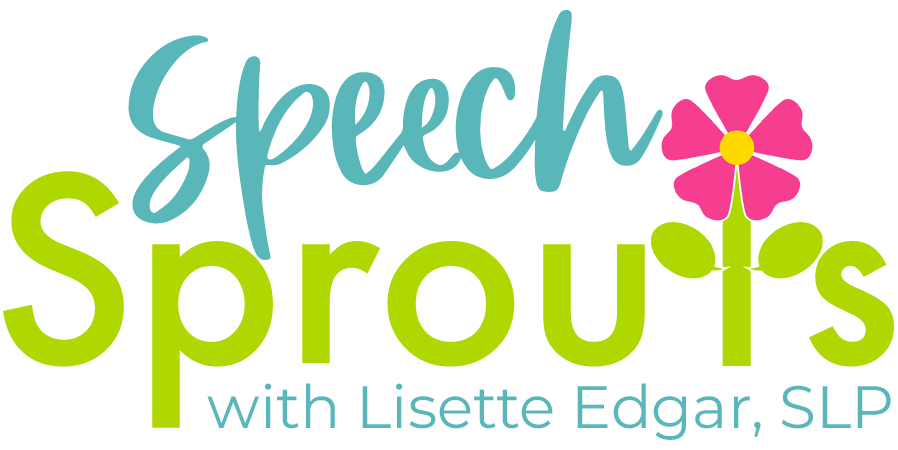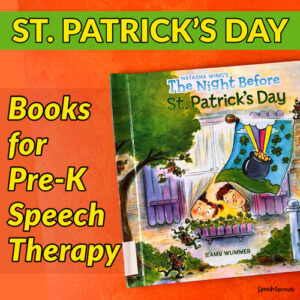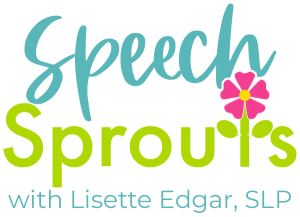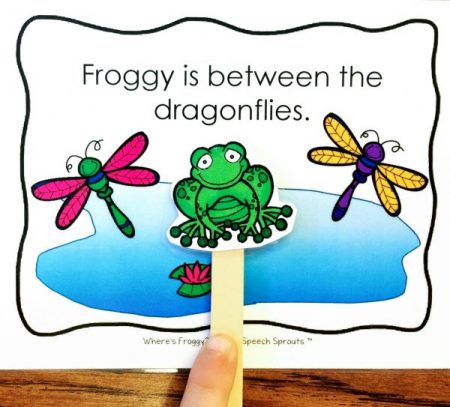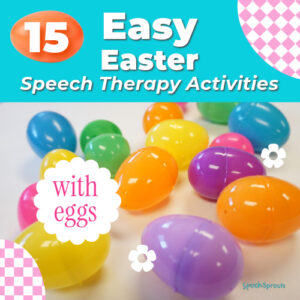
How to Choose the Best Games for Speech Therapy
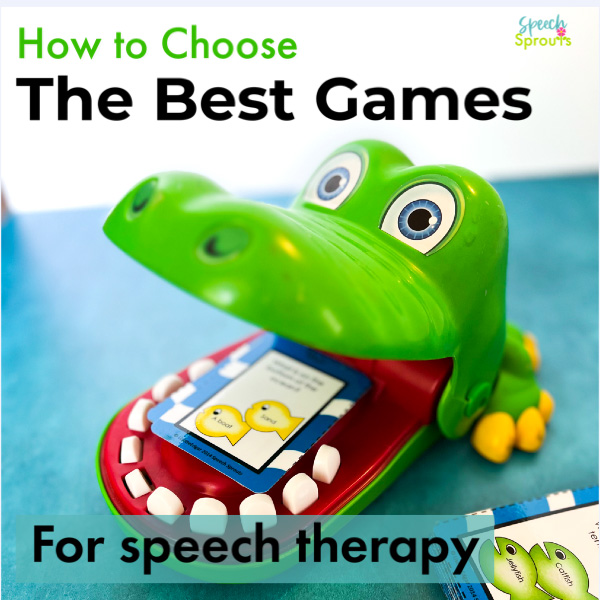
What are some of the best games for speech therapy?
Children love playing games in therapy. I really do too, it keeps my students enthusiastic, engaged and it’s so much fun to see their excitement. I believe that play is a really valuable tool in creating speech and language learning that lasts.
There are benefits to using games in speech therapy
We sometimes get asked, “You play games all day in therapy, don’t you?”Yes ma’am, sometimes we do! I am unapologetically a fan of using games in therapy. It’s playing with a purpose!
While games are motivating and enjoyable, they also provide practice for many skills, especially social skills. Ever have a child who just can’t handle not being first or not being the winner? That child needs practice handling disappointment gracefully when things don’t go their way!
So when one of those inquiring minds asks why you play games, let them know that you’ll be working on:
- turn-taking
- waiting
- making requests
- complimenting, encouraging others
- being a graceful winner
- handling disappointment/ losing
Sometimes the cutest, snazziest-looking games just aren’t right for therapy
I admit it, I have purchased a few games for speech therapy that were used only once or twice. Then they just sat on the shelf gathering dust, because they were really not working for me. Maybe it took too much time away from getting responses or maybe they were only useful for a single goal. There was even that one that made that annoying noise that I couldn’t stand by the end of the session. (Ugh, I disabled that critter!)
So I learned that you want to be really purposeful in choosing games for speech therapy that take up that uber-valuable real estate on your therapy shelf. Because there is never enough of that.
5 tips for choosing games that you will pull out and play in your sessions again and again, guaranteed.
- Kid-Appeal: Is it colorful, does it have manipulatives, is there a theme that kids will like? Does it appeal to a range of ages?
- Quick turns: I want to focus on my speech and language targets, get as many responses in a session as I can, and keep student interest high. To do this, I need a game that takes very little time to actually play each turn. The game is just for fun and motivation, not the real focus of the session (although my kids may think so!)
- No Batteries: Face it, replacing batteries is expensive. My favorite go-to games are played with kid-power.
- Simple: Can even young children play the game? Those with motor issues? Make mine easy to play, please. No worries, I can differentiate and add the proper amount of challenge for each student with the therapy tasks we’re working on.
- Versatile: I love a game that can be used year-round and with various students. Have mixed groups? Me too, so I want games that everyone can play together, even when working on diverse targets.
Other things to consider: Is it quick and easy to set up and clean up? Too many or easy-to-lose parts? Too noisy?
Here are some of my favorite games for speech therapy. What are yours?
Fishing Games
Look for a fishing game that’s sturdy (avoid the flimsy plastic ones), does not run on batteries, and is easy for small hands to manage. Catching a fish is a quick and fun motivational activity. A fishing game is also perfect for your camping, pond, and ocean themes.
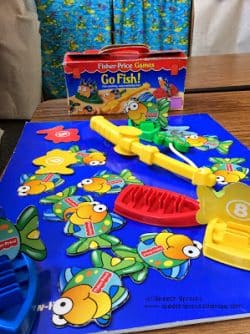
The game pictured here is the Fisher Price Go Fish Game. Unfortunately, it’s no longer available new. If you see it at a garage sale, snag it! Garage sales are my favorite place to shop.
In this game, kids “fish” with the suction cup fishing pole. I love that it has four different colored boats to sort the fish into once they’re “caught.” Children can sort their fish by color or play for points.
If you can’t find this one, I also like this magnetic Wooden Montessori Fishing Game.
You can easily make your own DIY fishing game too.
Hang a magnet from a string, and tie the other end of the string to a “pole”. I use a wooden dowel.
Cut out some paper fish and attach paper clips to them. You can add articulation or vocabulary pictures to the back if you like. Make the fish 3-4 different colors, and you can have a sorting-by-color task when done.
Lay the fish on the floor and let your children “go fishing.” Children practice their word or goal, then catch a fish.
See the fishing hole I created that was featured in the ASHA Leader’s article: Fishing for SH
Pop-up Pirate
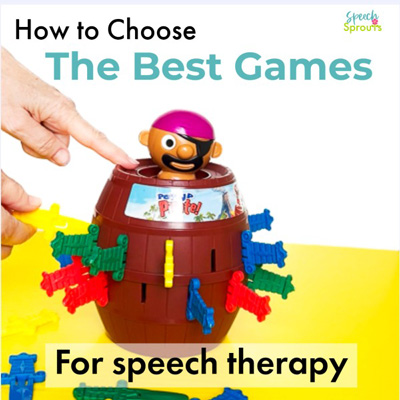
Kids really love it when something unexpectedly goes flying in the air. That’s what happens in this game when you insert one of the plastic swords in just the right spot.
I love that it takes just a few seconds to hand a sword to a child after practicing their goal and let them put the sword in the barrel. Downside? Even though I know it’s coming, I jump when the pirate pops! Every. Single. Time. But maybe that’s just me.
Another fun “pop-up game” is the Jumping Jack Game by Goliath. Pull out the carrots until the rabbit jumps!
Crocodile Dentist
It’s fun to place cards in his mouth! Students reach in, take a card and then press down on one of the crocodile’s teeth. Will he snap his jaws shut and catch you? See this fun game at the top of this post.
Please note: I am not affiliated with any of the companies mentioned and don’t receive compensation from them. These are simply games that I own, and I love using in my speech therapy room.
Monkeying Around
Hang a monkey in the tree after each turn practicing your goal. Be careful you don’t put too many monkeys on one side, or the tree may come crashing down!
In this game, the tree’s “canopy” is held on the overhead branch with a magnet, creating a challenge requiring children to distribute the monkeys evenly. It’s great for older elementary kids, but too challenging for little ones.
So… for preschool through first grade, I use a rubber band to secure the canopy to the branch, and we just have fun seeing how many monkeys we can hang in the tree.
The game also has a spinner, but I prefer to use dice, as the spinner can “shake” the tree.
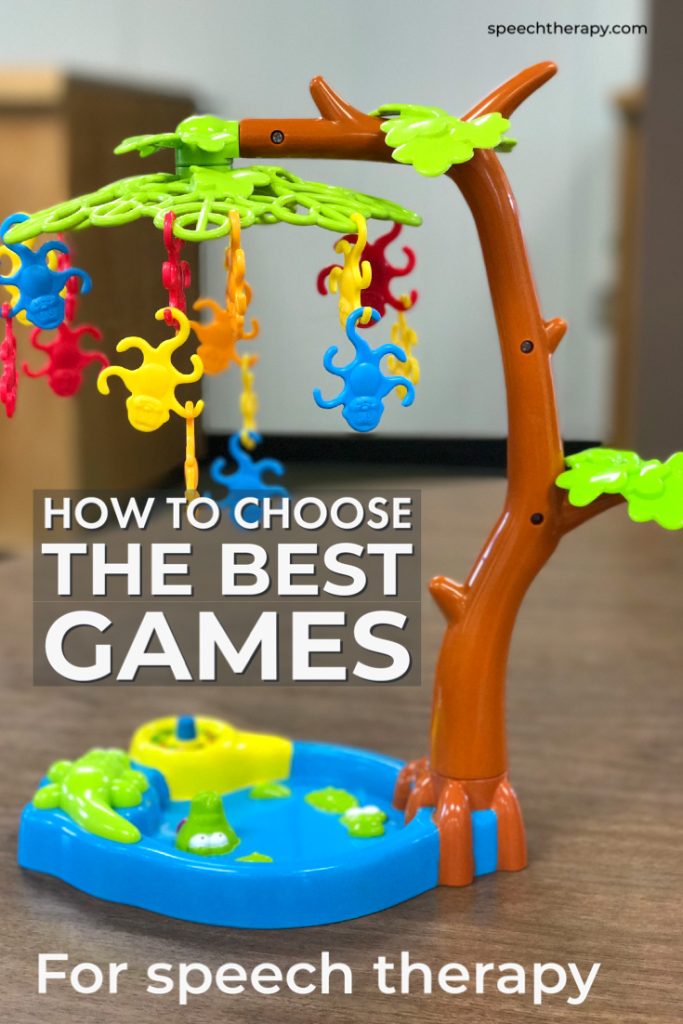
Next time: Read Thrifty Speech Finds!
Share it:
- Read more about: Uncategorized
